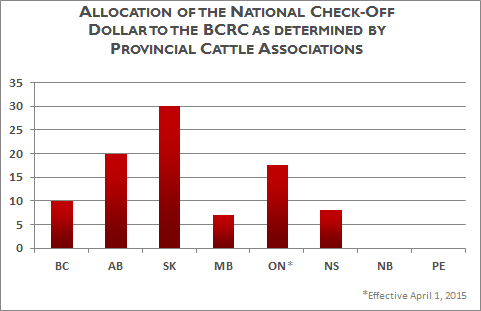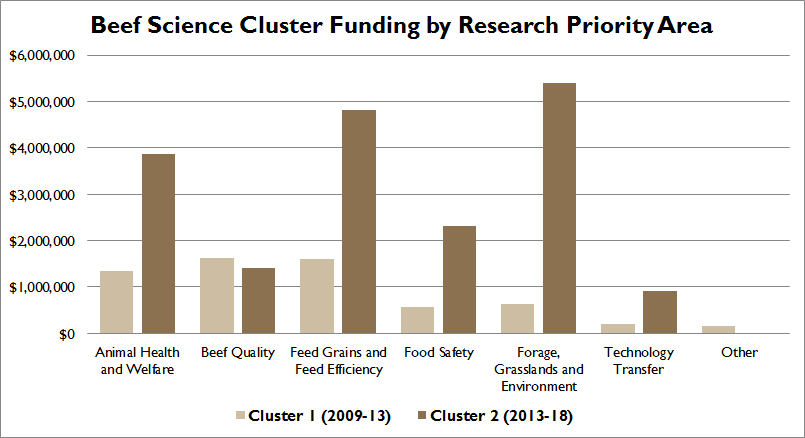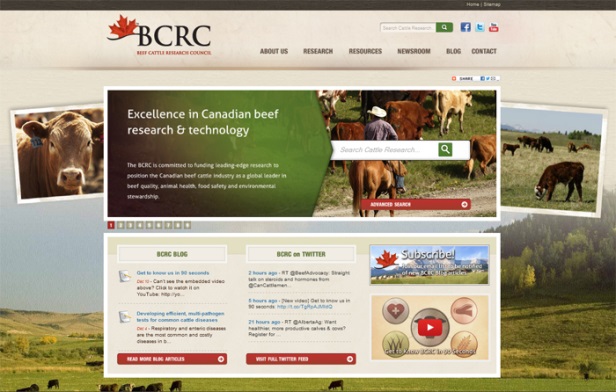BCRC Progress and Activities in 2014
This annual report highlights the BCRC’s main successes and core activities in 2014. To download a printer-friendly PDF version, click here

The Beef Cattle Research Council (BCRC) is Canada’s industry-led funding agency for beef research. Its mandate is to determine research and development priorities for the Canadian beef cattle industry and to administer National Check-off funds allocated to research. The BCRC is led by a committee of beef producers who proportionally represent each province’s research allocation of the National Check-off.
On average nationally, the BCRC receives approximately 16% of the National Check-off, and plays a key role in leveraging additional funding for beef, cattle and forage research. Recognizing this, the Council works to ensure the highest return on investment possible for industry contributions to research through ongoing consultation with other provincial and national funding organizations.
Canada’s Beef Cattle Industry Science Clusters
The first Beef Cattle Industry Science Cluster directed $10.5 million to 32 research projects between April 1, 2009 and March 31, 2013. It proved to be a very successful step towards improving coordination of beef research funding in Canada while generating meaningful, applicable results.

Joint industry and government commitments to the second Beef Cattle Industry Science Cluster (2013 – March 31, 2018) total more than $20 million, including $14 million in funding from AAFC and $5 million in funding from the research allocation of the National Check-off and provincial beef industry groups, in addition to investments by provincial governments. Funding was directed to 26 research projects. A summary of each project can be found by navigating under the Research tab on BeefResearch.ca, or download them all at: /files/pdf/beef_science_cluster_2_research_project_details.pdf
Highlights of research underway include:
Animal Health and Welfare
- implement a longitudinal disease surveillance network for cow‐calf operations in western Canada
- study the effect of age of beef cattle on pain, as well as pain mitigation during routine management procedures
Feed Grains, Feed Efficiency, and Forage and Grassland Production
- study how selecting for improved feed efficiency impacts maternal traits, as well as test whether genomic tests can sort cattle into more uniform slaughter groups
- provide Western Canada’s beef industry with a package of improved tame and native forages
- define how the environmental footprint of the Canadian beef industry has changed over the years, assess whether cattle production impacts ecosystem health, how pasturelands store carbon, and affect wetlands and habitat for species at risk
Beef Quality and Food Safety
- conduct a National Beef Quality Audit (NBQA) to measure improvements in the quality of Canadian beef over time
- enhance understanding of the causes of dark cutters
- improve education for packing plants on effective food safety procedures that are practical and cost‐effective
Research Performance Reporting & Evaluation
In order to demonstrate the value of National Check-off investments in research, as well as to encourage government to enhance their own investments in research, industry has taken a leadership role in communicating the value of investments made in beef, cattle and forage research. Due to the limited number of research dollars and a large number of research priorities, industry must also consider the short-term and long-term returns to various investment options during its priority and research program planning process.
An inaugural results report was developed and released in February 2014. The report outlines how Cluster 1 research is contributing to advancements in production efficiencies, quality and demand for Canadian beef. In many cases the financial impacts of deliverables to the industry were calculated; some impacts may not be fully apparent for several years.
Addressing Critical Capacity Needs
As highlighted in the 2012 National Beef Research Strategy developed by the BCRC and the national Beef Value Chain Roundtable, Canadian beef industry stakeholders strongly identify the need for continued and reinvigorated forage and grassland productivity capacity and research.
Having recognized ongoing cuts by government and other organizations to investments in research related to forage and grassland production, and disappointing impacts including declining tame hay yields, the BCRC substantially increased its proportion of funding to this area.
However, ongoing cuts to necessary expertise and infrastructure continue to erode research programs. The BCRC is working with AAFC and universities to maintain and increase capacity, and encourage the transition of new replacement scientists prior to retiring scientists’ departure to ensure research momentum is not lost.
Researcher Mentorship
In addition to sponsoring the participation of young research enthusiasts in the Cattlemen’s Young Leaders (CYL) program, the BCRC launched the Beef Researcher Mentorship program in August 2014. This new program grew out of concerns that unlike typical CYL participants, many new researchers do not have a background in Canadian cattle, forage or beef production. With limited practical production experience, it is challenging for them to develop an effective, industry-focused research and extension program.
Currently in the pilot phase, the Beef Researcher Mentorship program matches new researchers with producers and industry representatives who are valuable resources of information about day-to-day cattle and forage production, industry structure and influences, and perspectives on industry challenges and opportunities at regional and national levels. Three researchers were selected as inaugural participants.
Enhanced Collaboration to Maximize Research Investments
The BCRC continues to place significant focus on enhancing collaboration between itself, provincial check-off groups, and other funders (AAFC, ALMA, SADF, OMAFRA, and others) to ensure critical research priorities are addressed, reduce duplication, and reduce administrative burden for researchers and funding agencies.
As a tool to better enable collaboration and efficient use of research funds, the BCRC has taken the lead in developing a database containing research proposals that various funders are considering, as well as projects that have been funded. This allows all funders to determine whether all priority research areas are being addressed, while avoiding over-funding of particular research topics and improving coordination between funders. It also allows the BCRC to measure funder buy-in to the priority research outcomes identified in our 2012 National Beef Research Strategy.
Technology Transfer & Knowledge Dissemination

The BCRC continues to advance the implementation of its Knowledge Dissemination and Technology Transfer Strategy, which is focused on converting applied research into effective tools that drive industry competitiveness.
The website, www.beefresearch.ca, provides access to general information on research topics, summaries of in-progress and completed projects, and information that helps producers make informed decisions on implementing innovation into their production practices. The website delivers various BCRC-produced extension resources including articles, videos, webinars, and calculators.
Communications from the BCRC can also be found through the CCA’s Action News, provincial cattle organizations’ newsletters, email updates and magazines, and through a regular research column that appears in Canadian Cattlemen magazine.
Verified Beef ProductionTM program
In addition to sponsoring research and technology development, the BCRC oversees and supports the beef industry’s on-farm food safety program, Verified Beef ProductionTM (VBP).
VBP reports continued growth with increasing numbers of beef cattle operations trained each year. More than 18,200 beef operations across Canada are currently trained. This represents an estimated 72% of all Canadian beef production. In addition, more than 1,050 cattle operations have participated in the optional validation audit to become registered with the VBP program.
For More Information
To learn more about BCRC initiatives and take advantage of our extension resources, visit our website at beefresearch.ca and join our mailing list at beefresearch.ca/blog/subscribe
Click here to subscribe to the BCRC Blog and receive email notifications when new content is posted.
The sharing or reprinting of BCRC Blog articles is welcome and encouraged. Please provide acknowledgement to the Beef Cattle Research Council, list the website address, www.BeefResearch.ca, and let us know you chose to share the article by emailing us at info@beefresearch.ca.
We welcome your questions, comments and suggestions. Contact us directly or generate public discussion by posting your thoughts below.
